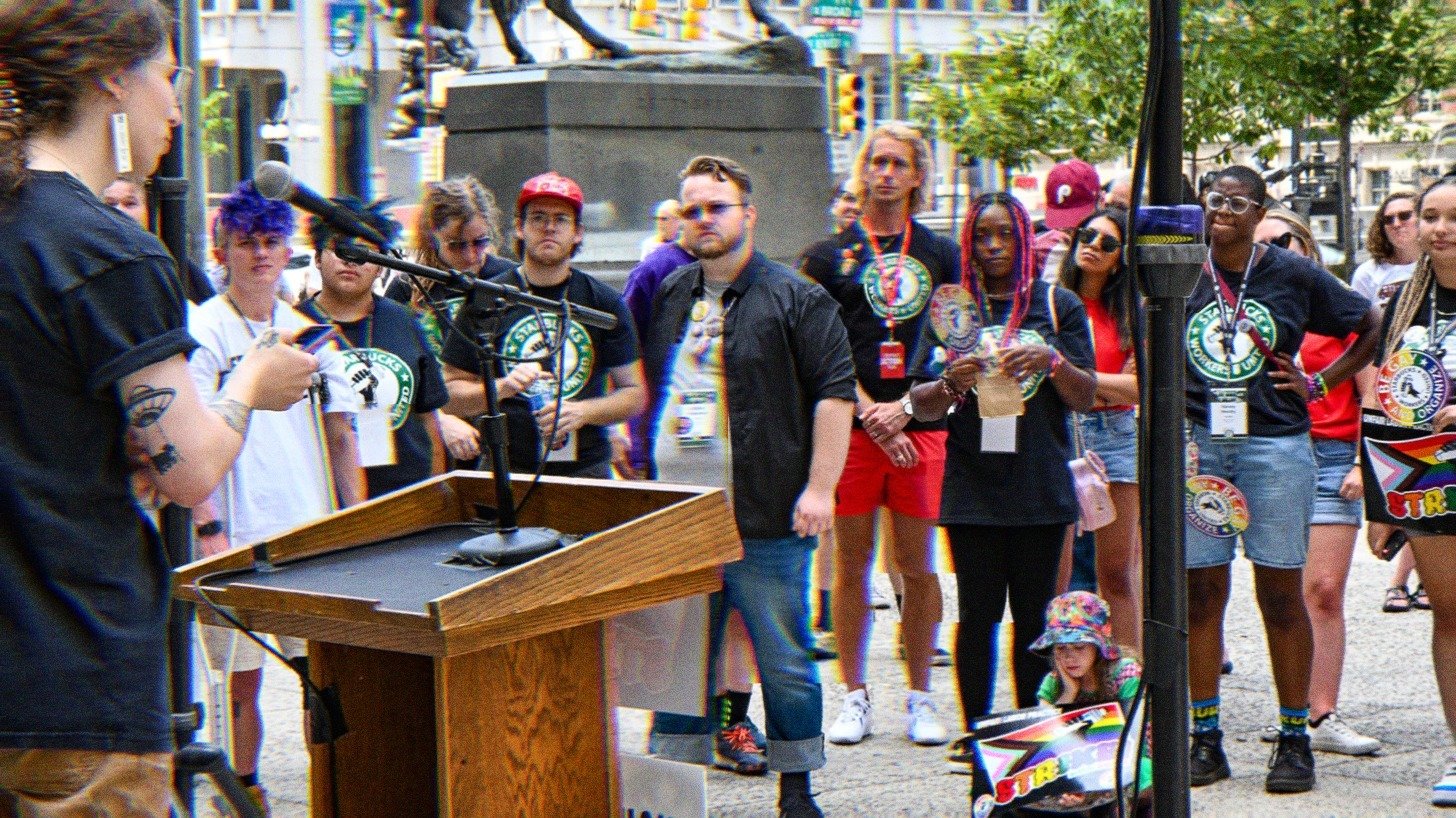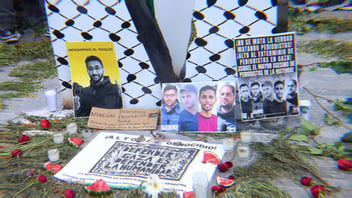Progressive Spotlight: Starbucks Workers United
Against all odds, workers in Buffalo unionized in 2021, sparking nationwide organizing efforts among baristas.
 Image Description: Starbucks workers and organizers gathered at City Hall in Philadelphia. Someone stands at a podium speaking to the group that is gathered. Many are wearing shirts with the Starbucks Workers United logo on them.
Image Description: Starbucks workers and organizers gathered at City Hall in Philadelphia. Someone stands at a podium speaking to the group that is gathered. Many are wearing shirts with the Starbucks Workers United logo on them.
Tell Starbucks to keep its holiday drinks off the menu—at least until its workers get what they deserve.
That’s the message from Starbucks Workers United (SWU), the union representing about 12,000 baristas across more than 600 stores in the United States.
The union, which emerged in late 2021 after its Elmwood store in Buffalo, NY became the first to unionize, announced a strike on Nov. 13 following months of unsuccessful negotiations with the coffee chain. Among the unsettled demands: better staffing at Starbucks stores across the country, higher wages, increased hours so more employees have access to benefits, and a resolution to “hundreds of unfair labor practice charges.”
The action, dubbed “Red Cup Rebellion” in reference to the corporation’s popular holiday-themed paper chalices, has spread to more than 95 stores across 65 cities.
“Union baristas mean business and are ready to do whatever it takes to win a fair contract and end Starbucks’ unfair labor practices,” Michelle Eisen, a barista and Starbucks Workers United spokesperson, said in a statement as the strike launched. “We want Starbucks to succeed, but turning the company around and bringing customers back begins with listening to and supporting the baristas who are responsible for the Starbucks experience. If Starbucks keeps stonewalling, they should expect to see their business grind to a halt. The ball is in Starbucks’ court.”
In its announcement, the union warned that workers are “prepared to escalate” absent tangible progress toward finalizing a contract.
The strike has drawn high-profile political support. NYC Mayor-Elect Zohran Mamdani, among others, has expressed solidarity with the union, while more than two dozen U.S. senators and scores of House representatives sent letters admonishing Starbucks and calling for a contract settlement.
“We are writing to express concern regarding Starbucks’ failure to reach a fair first contract with its baristas. Additionally, we have heard of a troubling return to union busting, which has impeded the ability of Starbucks workers—many of whom are our constituents—to exercise their statutory and constitutional right to organize,” the senators wrote to Brian Niccol, Starbucks’ CEO, on Nov. 10.
Starbucks engaged in bad-faith labor practices from the outset of SWU’s formation. Former CEO Howard Schultz told a barista, “If you’re not happy at Starbucks, you can go work for another company”—a federal labor law violation.
The company has been accused of hundreds of other labor violations, most notably the firing of the so-called Memphis 7, workers union leadership says were targeted for their organizing efforts. The case reached the U.S. Supreme Court, which decided in the java behemoth’s favor.
Accusations of unfair labor practices have been ubiquitous since SWU’s creation, earning Starbucks the distinction of being the “biggest violator of labor law in modern history,” with more than 500 such violations documented in Administrative Law Judge and National Labor Relations Board findings.
For its part, Starbucks dismissed the union’s criticisms. In a statement following the strike authorization vote, the company claimed that only 4 percent of its workers are represented by SWU and accused union leadership of walking away from the negotiating table. The statement includes a subhead titled “The best job in retail,” presenting company policies as a net benefit to workers.
Jasmine Leli, a barista and strike captain in Buffalo, shot back: “Our fight is about actually making Starbucks jobs the best jobs in retail. Right now, it’s only the best job in retail for Brian Niccol.”
Life is indeed good for Niccol. In January, he was rewarded a $96 million compensation package after being on the job for four months.
As Yahoo! Finance reported: “In addition to his package, Niccol uses a company-owned jet to fly from his home in Newport, California to Seattle where Starbucks has also agreed to cover temporary housing costs.”
Niccol, the former Chipotle CEO, arrived in summer 2024, months after SWU and the company announced a commitment to negotiating a foundational framework for contracts.
According to SWU’s timeline of events, the first bargaining session was held in April 2024, followed by consecutive months of “multi-day” negotiations. Niccol took over as CEO in September, and by December progress stalled. That’s when SWU filed a complaint with the NLRB alleging that Starbucks “refused to bargain and engaged in bad faith bargaining.”
As of the time of publication, the strike continues, and SWU has declared, “We’re just getting started.”
At this point, nothing SWU accomplishes should surprise you. Born from a unionization effort at a single store in 2021, the labor group won union votes in more than 250 stores in less than a year. Taking on the literal titan of the industry was a major victory in its own right—not to mention forcing the coffee juggernaut to send corporate executives to Buffalo as it became increasingly clear that the union vote would succeed. And it came at a time of renewed appreciation for the broader labor movement, which has been on a decline across industries for years.
Small, mighty, and caffeinated—an intimidating formula, indeed.
Image Source
- Joe Piette “Starbucks Workers United rallies in Philly” Flickr, 22 July 2023. CC BY-NC-SA 2.0. Changes were made.
Rashed Mian is the managing editor of the award-winning News Beat podcast and co-founder of the newly launched Free The Press (FTP) Substack newsletter. Throughout his career, he has reported on a wide range of issues, with a particular focus on civil liberties, systemic injustice and U.S. hegemony. You can find Rashed on X @rashedmian and on Bluesky @rashedmian.bsky.social.


